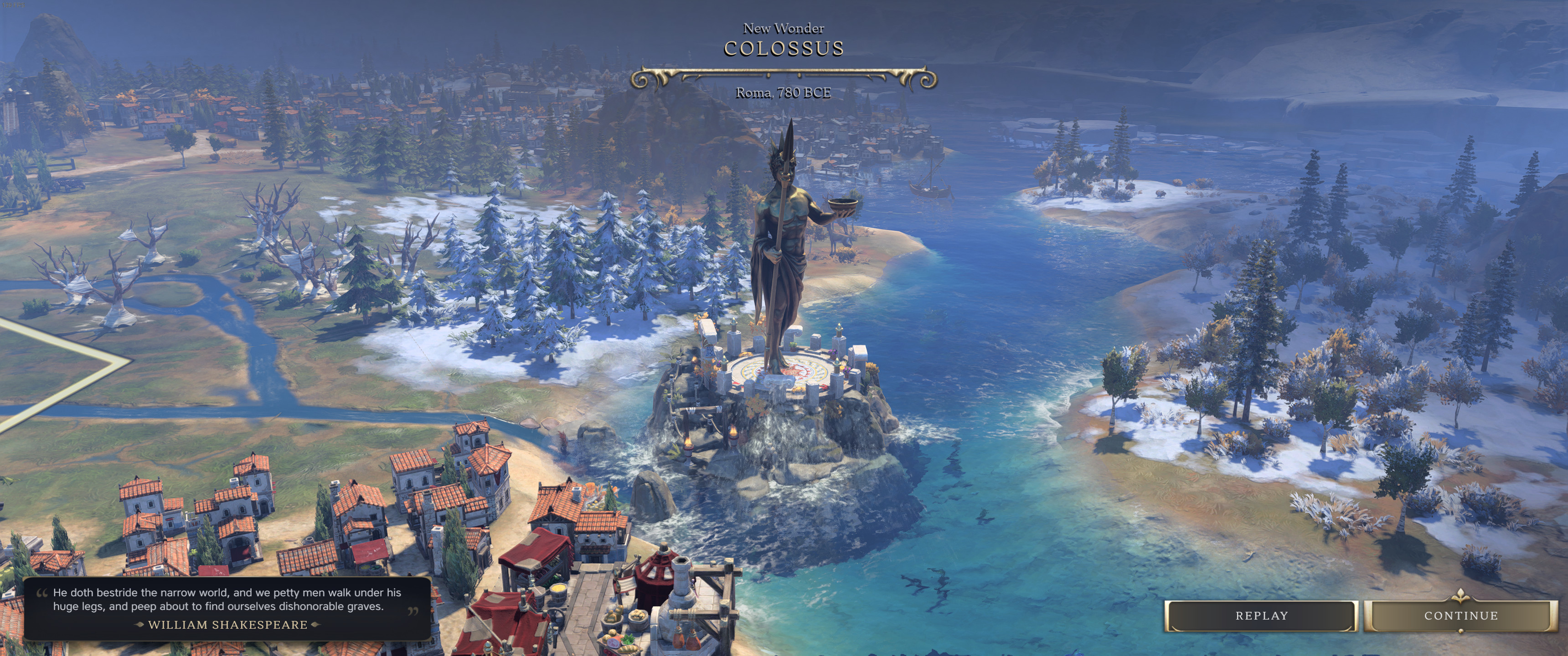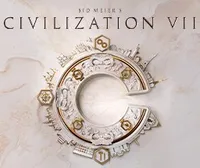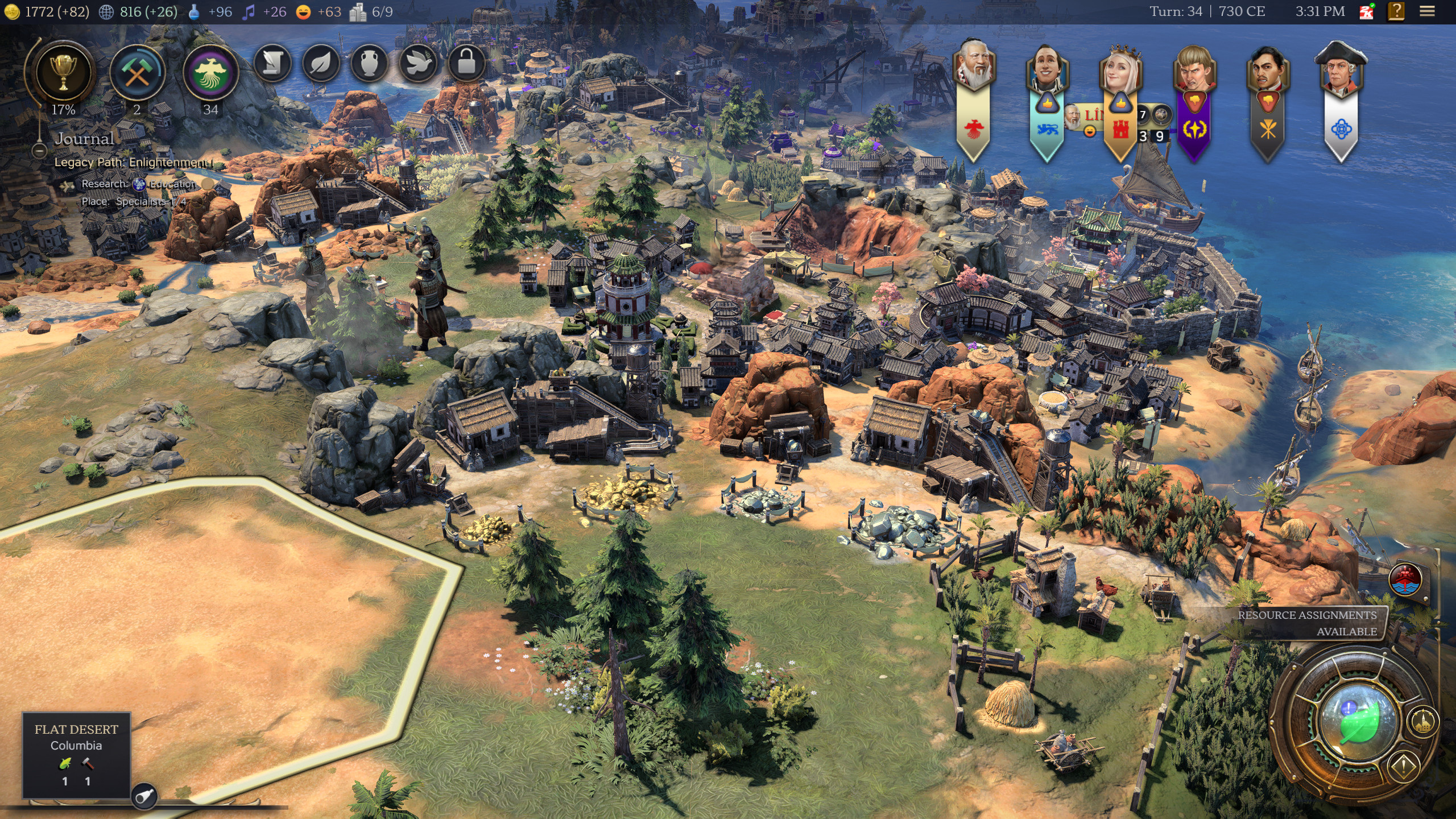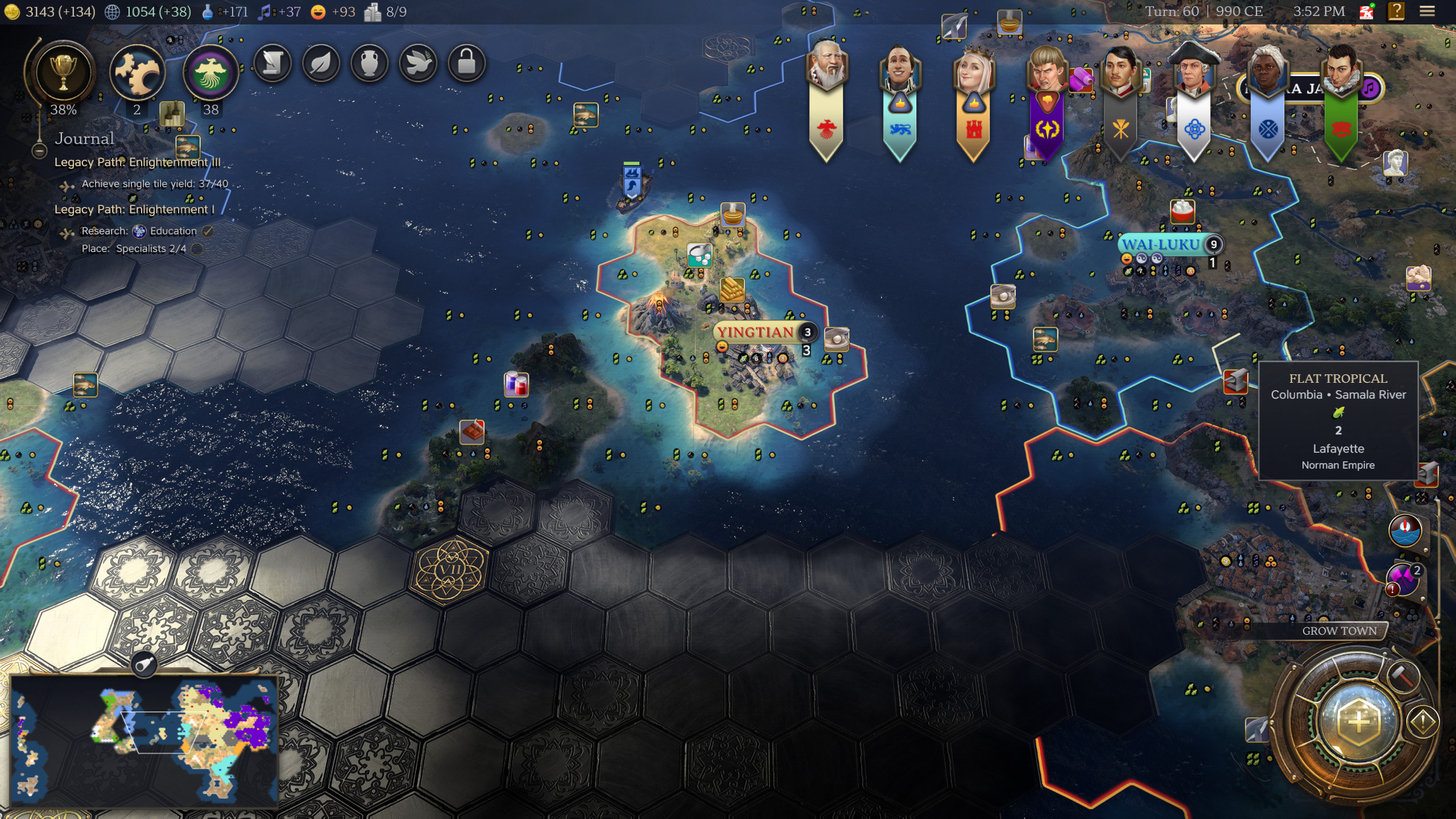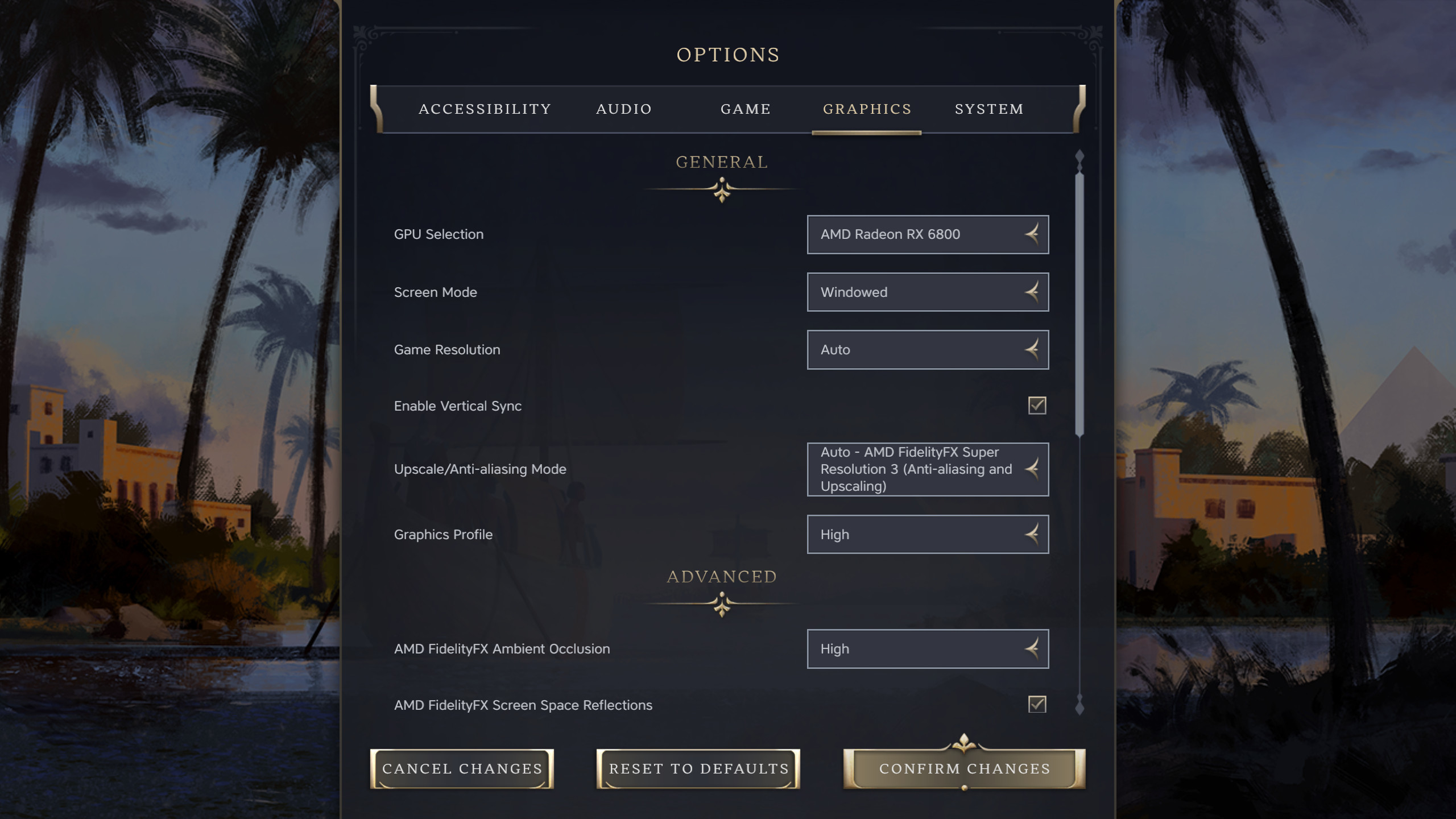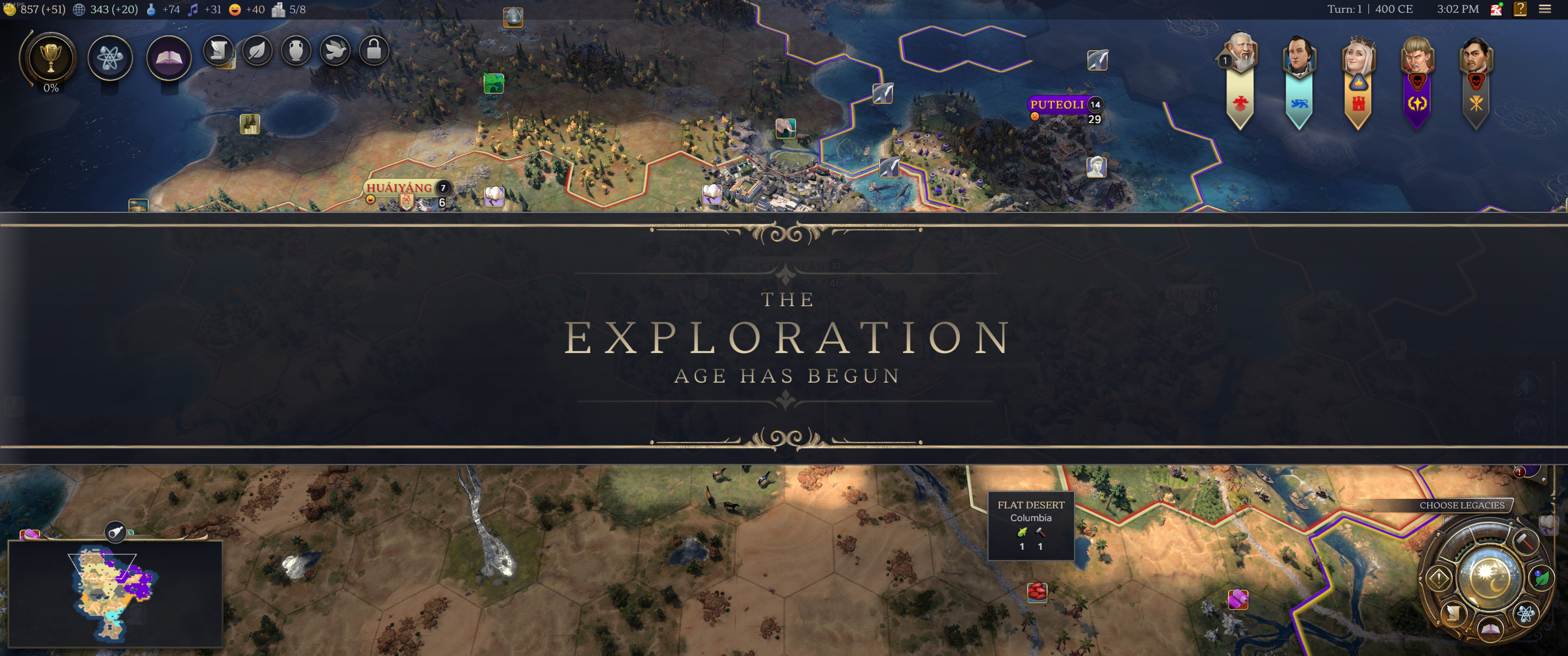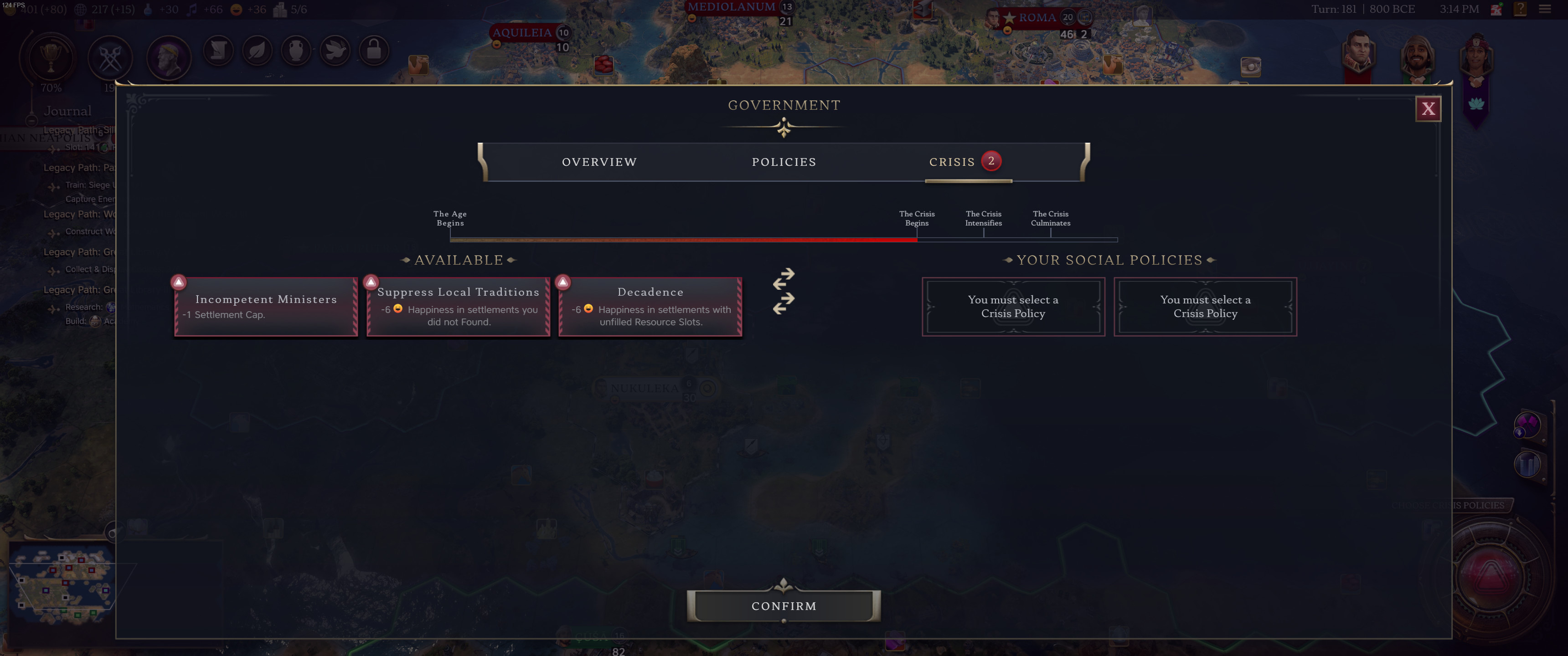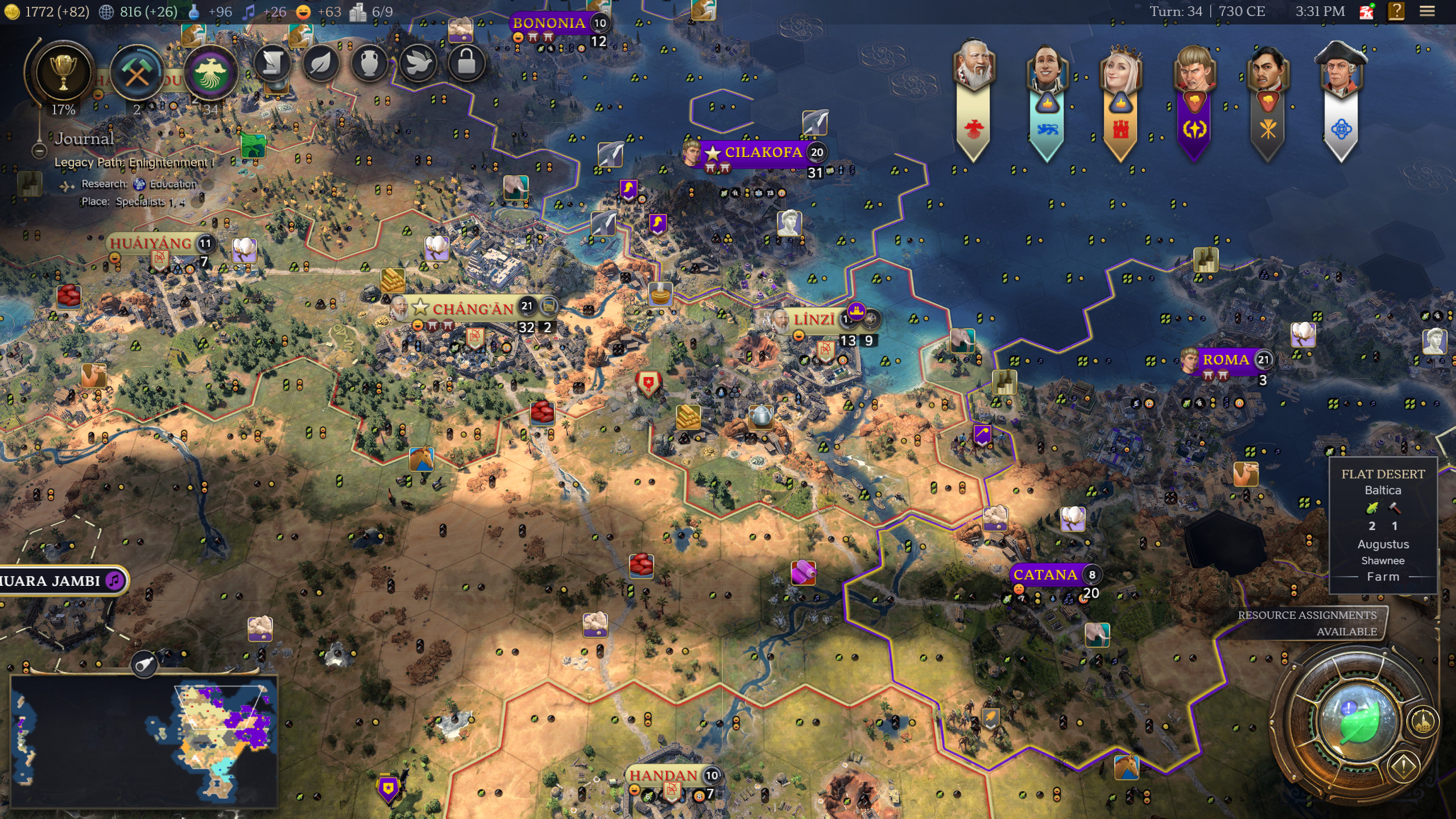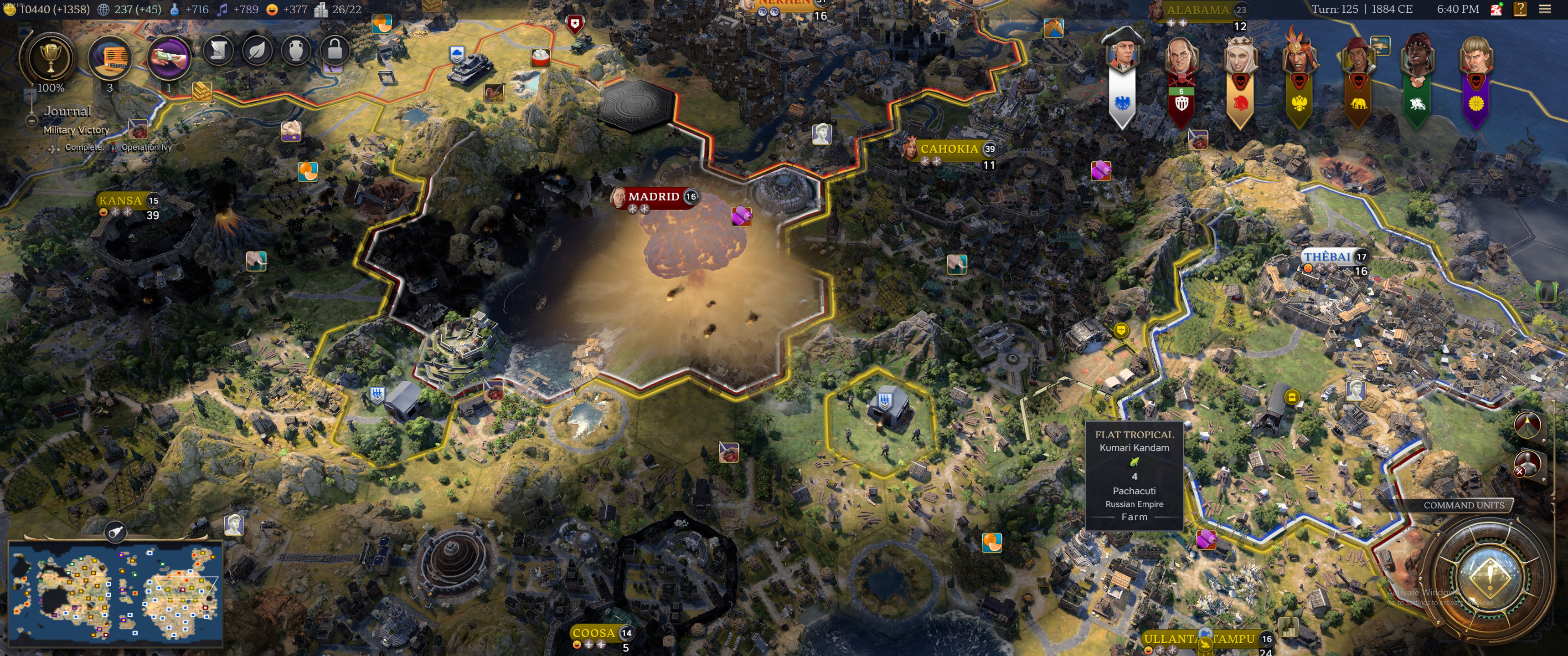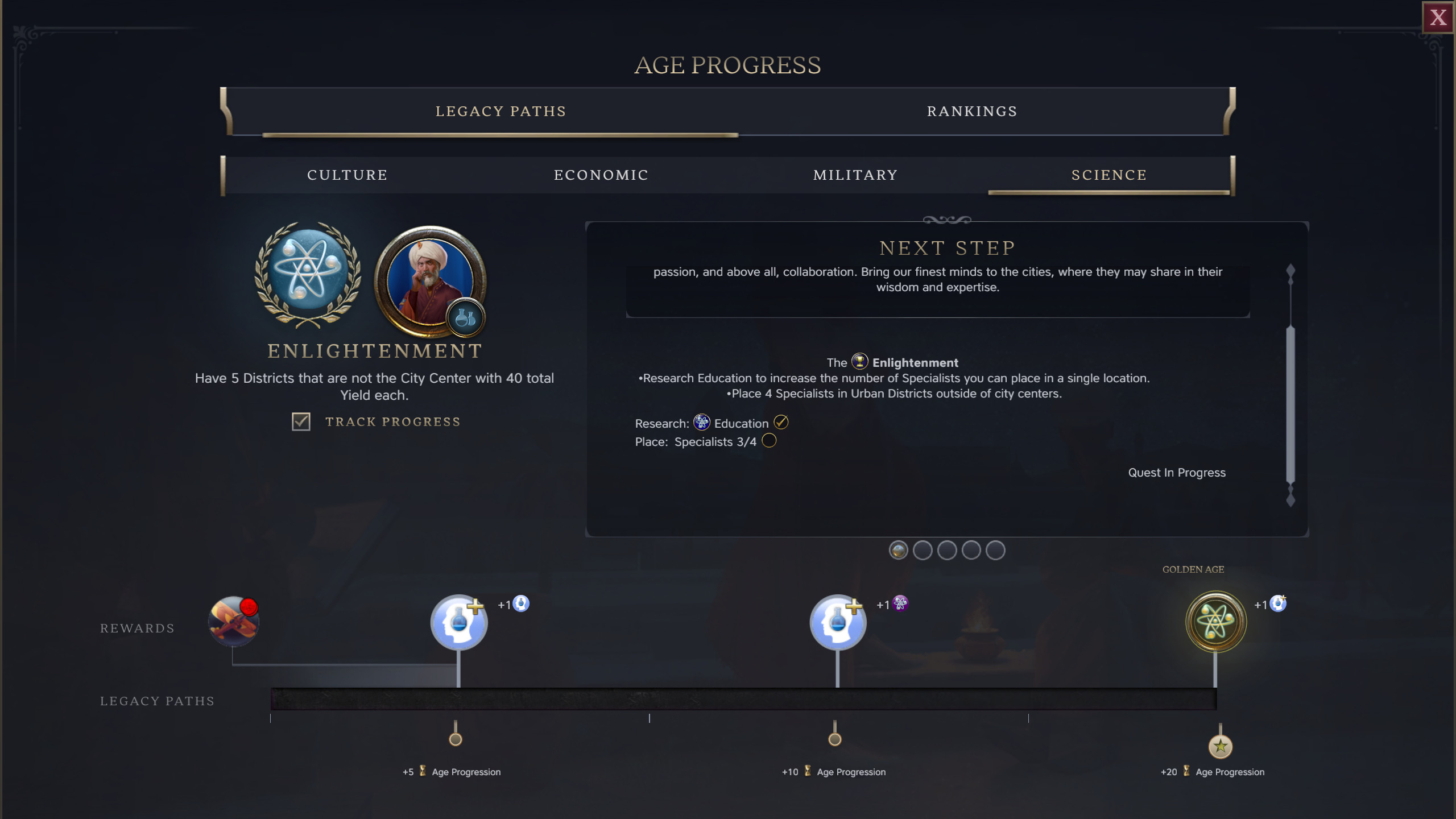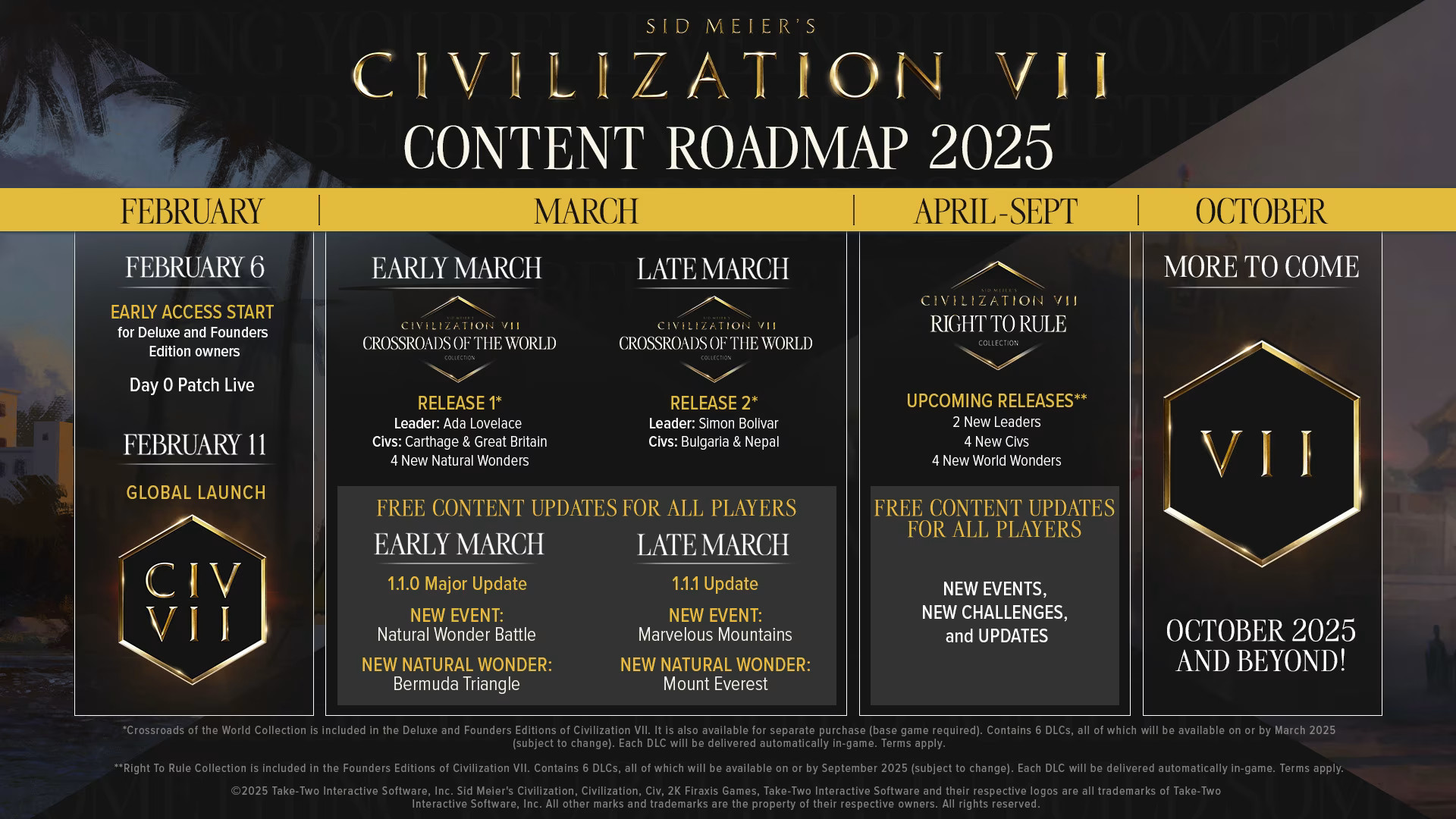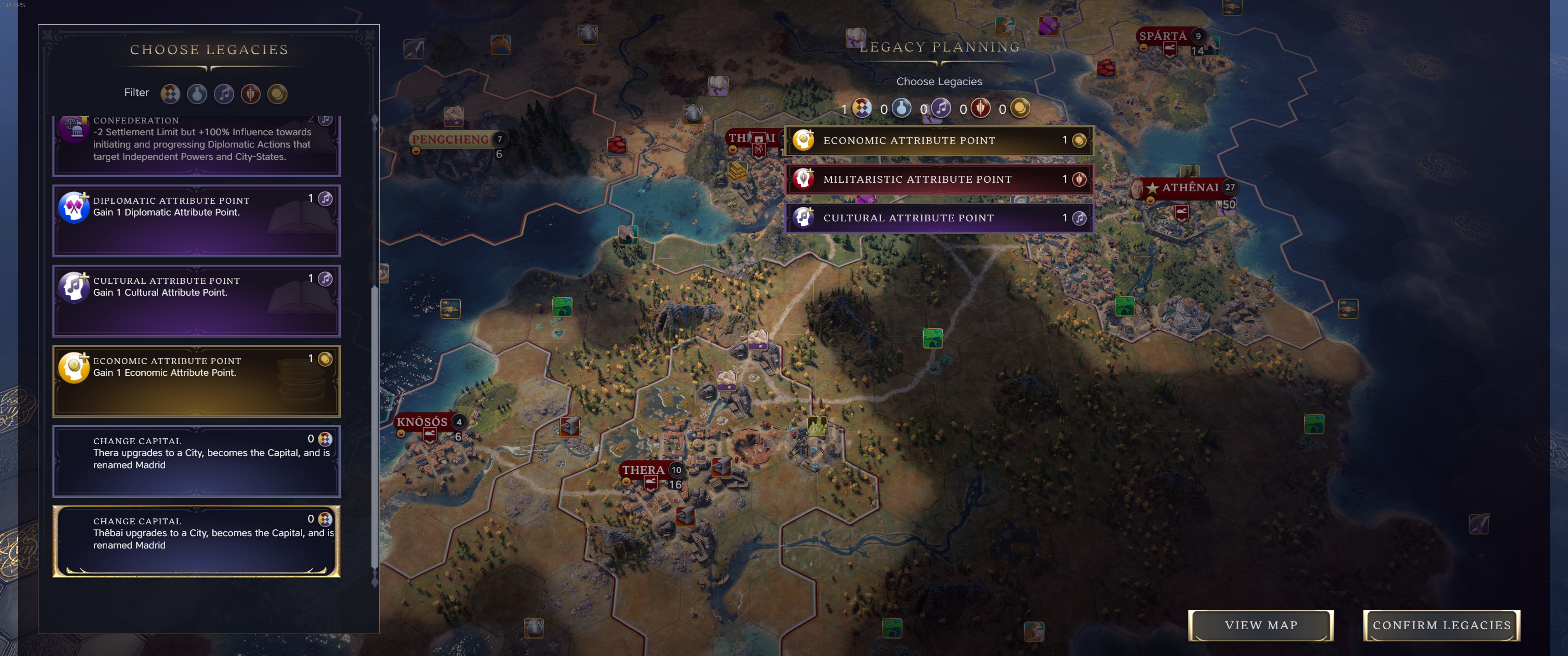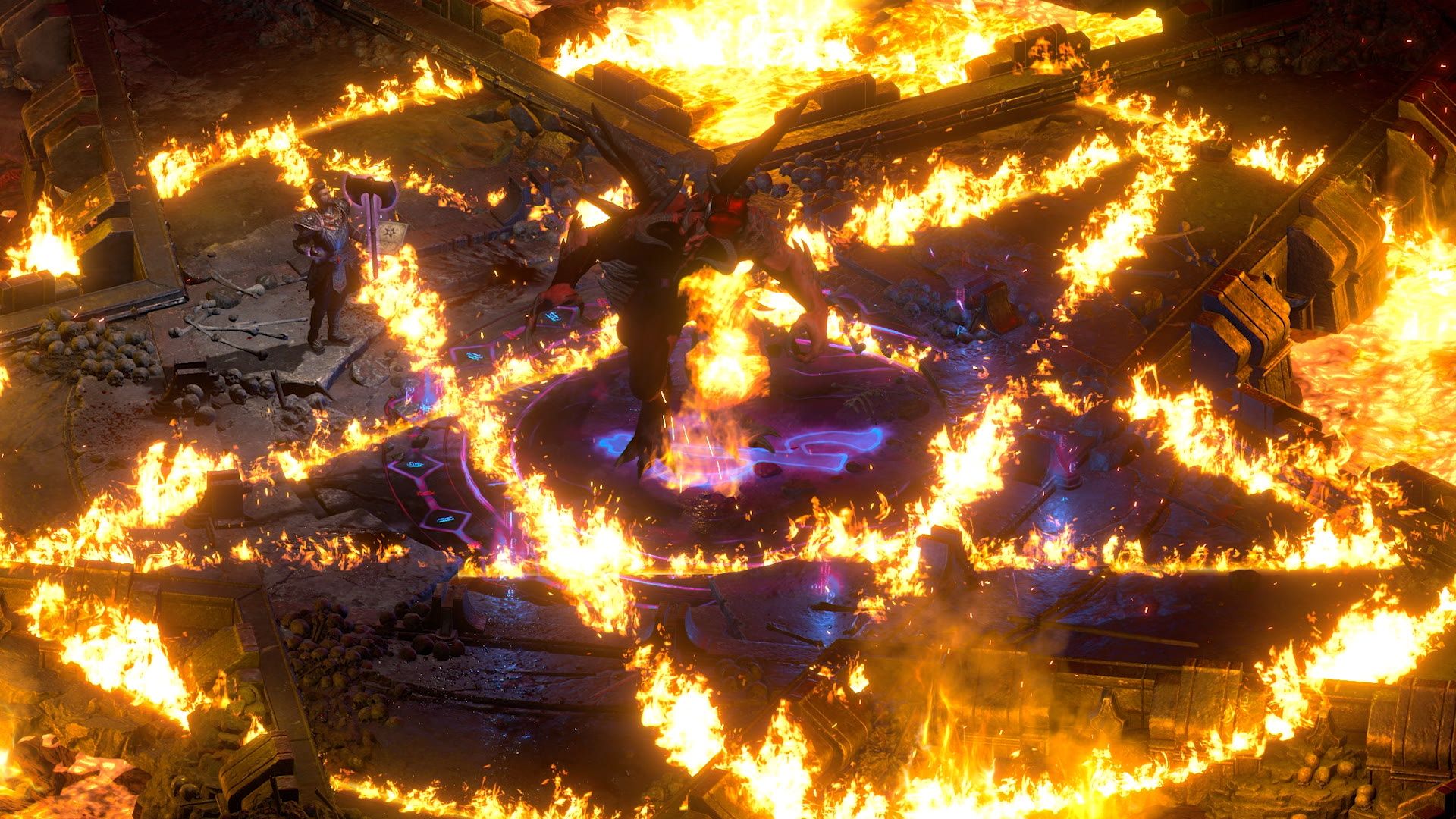Windows Central Verdict
Civilization 7's biggest changes fix mid- and end-game pacing, clean up clutter on the map, and open up more strategic avenues than ever before. Victory and unit balancing will no doubt be tweaked as developers receive feedback and data, but otherwise, the game is in a great state (something that's becoming increasingly rare in AAA games). Pricing and DLC gripes aside, Civilization 7 should prove to be the best playground for world domination for years to come.
Pros
- +
An overall premium presentation that is undeniably "Civ"
- +
Splitting ages into distinct sections saves games from growing stale
- +
Mixing and matching leaders and civs adds strategic variety
- +
A lot more emphasis on map positioning and resources
- +
20 leaders and 30 civilizations at launch
Cons
- -
Noticeable and repeated frame drops when looking at some menus
- -
Modern Age ends around the WWII era ... no Information Era
- -
Paid DLC content announced before the game launches always irks me
- -
Some minor visual bugs here and there
- -
Matches sometimes end abruptly, and the conclusion is muddy
Why you can trust Windows Central
In the world of PC gaming, the Civilization series has been around long enough to achieve what I consider "legendary" status. Creator Sid Meier has had a hand in all Civilization games, including the latest Civilization 7 installment that I've been playing on PC for the better part of a month.
• Price: $69.99
• Release date: February 6, 2025 (early access); February 11
• Developer: Firaxis Games
• Publisher: 2K
• Genre: 4X turn-based strategy
• Players: Single, multi
• Install size: ~20GB
• Platforms: PC, Xbox Series X|S, Xbox One, Playstation 4/5, Nintendo Switch, macOS, Linux, Steam Deck Verified
• Xbox Game Pass: No
• Reviewed on: PC
News surrounding Civilization 7's biggest changes has been drip-fed for months, and I can say after playing for more than 50 hours that developer Firaxis has not been shy about mixing things up. Civ 7 is immediately recognizable as a Civilization game, but it's not merely a reskinned Civ 5 or Civ 6. Those games already exist, and I don't mind seeing the formula get shaken up based on inside feedback the studio received from previous games.
Civilization 7 is a blast to play. The shakeup to age progression makes each game feel a lot less heavy. The new military units make waging war a lot less tedious. The newfound importance of map control adds another element to your overall strategy. And the ability to mix and match leaders with civilizations opens up more strategies than ever.
Firaxis and publisher 2K Games gave me weeks to play as much Civ 7 as I wanted ahead of launch, which is always a good sign. I took full advantage of my time, spending many late nights trying to end an age or a complete game. I wrote a Civilization 7 preview after about 20 hours in the game, and I've more than doubled my time since then. There's no way I'll be able to cover everything — Civ 7 is a massive game — but I'll touch on the points that stood out most to me.
And while I anticipate that the game's reception will be split between Civilization purists and more casual players like myself, I can't wait to get this review published so I can return to my latest conquest.
Civilization VII
Civilization VII is a turn-based 4X strategy game expected to launch on February 11, 2025. It's now available to preorder on all major platforms.
👉 See Standard/Deluxe/Founders Edition (PC) at CDKeys
👉 See Standard Edition (Xbox Series X|S) at CDKeys
👉 See Deluxe Edition (Xbox Series X|S) at CDKeys
Civilization 7: Visuals, sound, and settings
I spent the bulk of my time playing Civilization 7 on a PC with an AMD Ryzen 7 9800X3D processor, AMD Radeon RX 6800 graphics card, and 32GB of DDR5 RAM. I go into more depth regarding handheld performance in a moment, and you can check the game's PC requirements to see if your system can handle it.
At an ultrawide 3440x1440 resolution, the game ran smoothly most of the time, with in-game video settings maxed out. I generally had 100+ FPS while playing with AMD FSR enabled, but frequent frame drops during AI movement can make the game feel choppy. Viewing city development menus also often makes the game drop to single-digit frames; this is likely a bug that wasn't fixed with the 1.01 patch.
All the latest news, reviews, and guides for Windows and Xbox diehards.
I played for about 50 hours on the pre-release patch and had a couple of crashes. The 1.01 patch hasn't crashed yet in eight hours.
Civilization 7's visual tone sits somewhere between the grounded Civ 5 and the bubbly Civ 6.
Civilization 7's visual tone sits somewhere between the grounded Civ 5 and the bubbly Civ 6. Individual units are carefully and realistically modeled, animated leaders are less of a caricature, and the map terrain is oh-so-nice to look at, no matter how many hours I've been playing.
Settlements you capture, incorporate (using Influence), or establish can be assigned a focus when the population reaches seven. This halts the settlement's growth and sends its food to the nearest city, while production turns into gold and is also shipped out on the same theoretical wagon. A quick look at a town is usually all you need to tell what its focus should be, and an empire organically takes shape with rural settlements surrounding your bustling urban capital. Add some wonders and fortified walls, and you have a city bound to attract attention.
Music changes based on your chosen civ and the age in which you're operating. Antiquity Age music is generally basic, and Exploration Age symphonies highlight the progress you've made. The soundtrack hasn't yet grown stale after many hours of play, and I appreciate how it can fade into the background.
Gwendoline Christie, who notably played Brienne of Tarth in the Game of Thrones TV series, does all of the general voiceover work in Civilization 7. Researched a new tech or civic? You'll hear an apropos quote. There are some pleasant surprises, including a snippet from Thomas Pynchon in Christie's calming tone.
Playing Civilization 7 on Steam Deck
Civilization 7 received official Steam Deck verification a couple of weeks ago; great news for anyone who prefers a comfier playthrough. While the bulk of my time with Civ 7 has been on PC, I did play for about four hours on Steam Deck to see how it feels.
Aside from some crowded menus on the 7.4-inch display, the game feels good in between the hands. After playing hundreds of hours of Civ on a keyboard and mouse, the switch to gamepad controls took some time to get used to. I still can't complete turns as quickly as on PC and I still end up using the touch display when I want to quickly access some menus, but the mobility trade-off is well worth the drawbacks.
I have a separate guide regarding Civ 7 on Steam Deck and other gaming handhelds, in which I go into more detail. My first priority after writing this review is figuring out the best settings, which I'll share in the main guide.
Civilization 7: Gameplay
Civilization 7 looks and sounds great, but that doesn't mean much if it doesn't play like a Civ game. I can't cover everything due to the sheer scale of the mechanics inside; I'll do my best to nail the big stuff. Civ 7 makes some significant changes compared to its predecessors, and some may be divisive among Civ purists. From a more casual viewpoint, a lot of the concern is overblown.
Many of Civilization 7's new mechanics were built around player feedback from the older siblings. For example, developers felt that too many games never reached an ultimate conclusion. If you've played past Civ titles, you know how the mid-to-late game can get bogged down and become stale.
Civ 7's solution is to fracture the timeline into three ages, splitting them with a soft reset to your military, a return to settlements for all but your capital, and a new civilization to take into the next age. Each age — Antiquity, Exploration, and Modern — plays out like a full game, with a unique tech tree, civics tree(s), victory path assignments, and units. Random narrative events, of which there are more than 1,000 in the game, pop up to add some flavor. Certain actions performed by any player during the age push the ever-present age timer forward. When it reaches 100%, the age or the game ends.
Around the 75% mark, a randomized crisis begins. As with your social policies, crisis slots are opened, and you're presented with a few options with which to fill them. Your crisis might not drastically affect your civ if you get lucky with the random draw, but other times, it can be a real struggle to navigate. All players receive a crisis at the same time, so there's sometimes a rippling shift in the game. A player might suddenly want to make peace after many turns of war, while others will see their happiness tank just when they were expecting a celebration and its bonuses.
Civilization 7 is much easier to set down upon reaching the age's end rather than some arbitrary point. Most games I played were naturally split into three nights; upon loading a save, I could make my age-end decisions and feel like I was starting fresh. I know this change will also benefit multiplayer games with friends. Deciding where to end the game during a limited hangout is a lot easier than before.
Building cities for a new age
When you enter a new age, most of the buildings from the previous age can be replaced (barring the "Ageless" buildings that persist throughout the game). This is called "overbuilding," and it's a method to keep urban sprawl in check.
I don't think I've ever paid so much attention to how I build my cities, as you can definitely game the system to create huge yields. I found that to be especially important when going for the Enlightenment victory, which requires you to have large yields on several tiles outside of your city center.
The capital city generally becomes a massive urban center with strong culture and science, while settlements with a chosen focus feed the cities with food and gold. You also need to keep an eye on resource assignments to your settlements, cities, and factories; the right combination can make a big difference in your game.
Don't have a resource that you desperately need? Time to take it with commercial savvy or by military force. New resources appear in each age, and you eventually build factories in the Modern Age to process special goods from far-off lands. They can benefit everything from happiness to culture to military production.
War ... sometimes changes
Speaking of war, new Commander units are a godsend for players like me, who often end up creating massive armies that roam the continents. Whether you're attacking by air, land, or sea, Commanders are now a crucial part of any army composition. Most notably, Commanders have up to six slots in which you can assign other military units. Even if you have all six slots filled, you only need to move the Commander to move the entire army. Commanders also have special one-click skills that make it easier to direct all units in the command radius to perform the same action.
In one game, I had a massive navy by the end of the Modern Age, complete with aircraft carriers, destroyers, battleships, and submarines. I was attacking inland cities and settlements with fleets of bombers launched from my carriers while razing coastal tiles and protecting my fleet with the other ships. In previous Civ games, this would have meant extreme micromanagement and clogged tiles.
I foresee some balancing changes to military units in upcoming patches, as right now air units feel very overpowered. Mixing them with strong defense basically makes planes invincible against land units, especially if you add perks for damage against enemy aircraft that counter your attacks.
Geography and positioning play an important role in Civilization 7.
Commanders each have a set of skill trees. You unlock points through military conquest, and Commanders who have leveled up even a few times can sway an otherwise unwinnable battle in your favor. Not only that, you can also set your Commanders up to help quell unhappiness and revolt in settlements and cities.
Geography and positioning play an important role in Civilization 7. So important, in fact, that the devs removed the Scout's auto-move toggle present in Civ 6. Creating trade routes also requires a bit more management, and you might even want to use your merchants to create new direct roads between towns to improve trade. While the game does away with some of the more tedious parts — builders, ungrouped military units, etc. — it adds more management where it matters most.
I played 15 hours for this?!
I've so far played two games of Civ 7 through to their conclusion, and I did some A/B testing to figure out how game-ending mechanics work. As far as I can tell, if the age timer reaches 100% in the Modern Age and no player has completed a victory path, the win goes to the player with the most Legacy points collected over the course of the game, whether from economy, military, culture, or science sectors.
It's difficult to tell for certain since, upon losing to an age timer, the game doesn't really show you a detailed breakdown of each player's game. It just ... ends with a "Defeat" page. You can see your own progress in the defeat, but it doesn't even tell you who won. I thought this might be a bug with a pre-release build, but it continues in the 1.01 patch.
The game offers notifications when players hit victory path milestones, but you need to keep a careful eye on how many Legacy points have been accrued. There's no option to turn off a victory through points — a byproduct of the new split age setup and the age timer — so I expect to see a lot of games abruptly end.
The new Influence points can be used to sabotage specific areas of an opponent's domain, and this will likely be a big key in getting the timing right for your own victory.
I also don't exactly know what the right strategy is concerning research. If all I have left in the late-game is the "Future Tech" option that pushes the age timer forward (possibly ending the game,) but I'm trying to finish the last mission of the space race, I could end up hurting my own chances of victory by ending the game too soon and handing the win to a player with more Legacy points.
The new Influence points can be used to sabotage specific areas of an opponent's domain, and this will likely be a big key in getting the timing right for your own victory. I don't necessarily dislike the new way that games end, especially if I can figure out how to better game the system, but in-depth details about the game I just spent 12-15 hours playing shouldn't be omitted.
Launch content, pricing, and DLC
Despite the new split-age mechanic, playing through a full game doesn't feel disjointed. Legacy points earned in each age carry forward into the next, unlocking specific power-ups for your next civ and your leader. Messing around with leaders and civs has revealed some interesting strategic combinations, even if not historically accurate. Do I really care if Confucius-led Greece becomes Spain becomes America? No. It's a video game. Each civilization's strengths and weaknesses apply no matter your leader's avatar.
Something I wasn't expecting is the game not having a true "Information Age." Civ 7 matches end in what feels like the early 1960s and your civilians never get to experience the neck (and social) pain associated with modern tech. I want to wage cyberwarfare! I want bullet trains connecting my cities. And I want to navigate the perils of life in the 21st century.
Civ 7 doesn't feel as complete without a post-modern era. However, Civ 5 and Civ 6 had rather boring post-modern eras that were largely expanded via numerous DLCs. Saving all the content instead for a future DLC — which Firaxis has so far said nothing about — isn't necessarily a bad idea.
Let's talk about content, DLCs, and prices. In a recent developer livestream, it was revealed that Firaxis plans to release the first DLC in two parts in March 2025, about a month after the game's launch. Crossroads of the World will introduce two new leaders, four new civilizations (including Great Britain), and four new natural wonders. The second DLC, called Right to Rule, is expected sometime between April and September 2025. It adds the same content combo as the first DLC.
Buying the Civilization 7 base game for $70 USD — $90 CAD for me — doesn't include these DLCs. To secure the first DLC, you need to buy the Deluxe Edition for $100 USD or $130 CAD. To secure both of the announced DLCs, you need to buy the Civ 7 Founders Edition. It goes for a whopping $130 USD or $167 CAD(!).
Civilization 7's base game is enormous.
Civilization 7's base game is enormous. There are 20 leaders right off the hop, with 30 civilizations spread out over the three ages. Compared to Civ 6 at launch, Civ 7 has more leaders, more civs, and more wonders. It also has more unique units, buildings, districts, and improvements. You certainly don't need to buy anything but the cheapest version to have a good time, and Firaxis has outlined free updates — mostly to do with events and natural wonders — coming for all players on roughly the same schedule as the DLC.
Nevertheless, I hate to see paid DLCs announced before the game has launched, especially when the base game isn't exactly cheap. As it was with Civ 6, I expect to see a lot of players wait for all the DLCs to launch before buying the "full" game at a discount.
Civilization 7: Conclusion
Having access to Civilization 7 for weeks ahead of launch has allowed me to spend more than 50 hours with the game, yet I still feel like I've barely scratched the surface of available content. There are leaders I've yet to play as, civilizations I've yet to lead, and victory conditions I've yet to achieve.
Civilization 7 doesn't stray so far as to not feel like a Civ game, but the new mechanics and units will make you reconsider your old strategies. Civilization 7 is easy to pick up and play for newcomers to the series, and for veterans, it offers more valid strategies than ever before. Many of the big changes in Civilization 7 are undoubtedly due to the newfound competition from 4X strategy games like Ara: History Untold, Old World, and Humankind; the devs didn't just want to give the series a facelift when other ways to operate a 4X turn-based strategy game have proven successful.
Civilization 7 doesn't stray so far as to not feel like a Civ game, but the new mechanics and units will make you reconsider your old strategies.
Most of my time so far has been spent playing against AI — putting up more than enough challenge on even the second-hardest difficulty for my skillset — and I can't wait to jump into multiplayer with friends. Yes, I'm recommending it to my gamer pals who have played past Civ titles. Civilization 7 isn't perfect, but I've had so much fun with it and don't plan on retiring it once this review is finished.
I'm not a fan of the game's price and DLC release schedule, which were already in place before the game has even launched. I recommend you start with the base game, see if you like the changes to the series, and then branch out into DLCs. There's more than enough content available in the base game for hundreds of hours of playtime.
Now, if you'll excuse me, I need to get back to world domination.
Civilization VII
Civilization VII is a turn-based 4X strategy game launching on February 11, 2025. It's now available to preorder on all major platforms.
👉 See Standard/Deluxe/Founders Edition (PC) at CDKeys
👉 See Standard Edition (Xbox Series X|S) at CDKeys
👉 See Deluxe Edition (Xbox Series X|S) at CDKeys

Cale Hunt brings to Windows Central more than nine years of experience writing about laptops, PCs, accessories, games, and beyond. If it runs Windows or in some way complements the hardware, there’s a good chance he knows about it, has written about it, or is already busy testing it.
